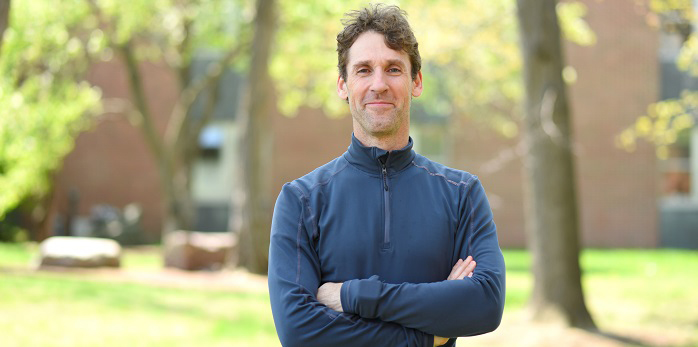UVM’s Legal Issues in Higher Education Conference is one of the nation’s leading conferences on issues affecting college and university campuses. Throughout the four days of the conference, in 12 live sessions, 20 pre-recorded presentations, and 15 roundtable discussions, leading experts will explore topics as diverse as campus communities and police, student mental health issues, and cannabis on campus.
An important focus of the conference this year is on students’ basic needs. With recent findings that 47% of all students experience food insecurity (Education Advisory Board – EAB) and that three out of five students experienced housing insecurity in 2018 (Hope Center for College, Community and Justice), it is an issue of paramount importance.
At the Legal Issues in Higher Education Conference, Adam Jussel, Dean of Students at the University of Wisconsin – Milwaukee, will address this topic in his presentation on providing for students’ basic needs, mental health, and wellbeing, highlighting issues around equity. Citing the #RealCollege 2021 Report(produced by the Hope Center, with contributions from students from 202 colleges and universities), Jussel sees these “data as a call to action.”
What is Basic Needs Insecurity?
The #RealCollege report defines basic needs insecurity as “a structural characteristic affecting students” of a college or university, in which “there is not an ecosystem in place to ensure students’ basic needs are met.” According to the report, students’ basic needs are food, housing, healthcare, technology, transportation, personal hygiene, and childcare.
Since “students cannot be expected to achieve academic success or personal wellness until they meet their basic needs,” according to EAB, “supporting food and housing security on campus should be a crucial priority for chief student affairs officers and other senior leaders.” To this end, the EAB offers recommendations for improvements in campus systems to address food and housing insecurity.
Focusing on real-world solutions to basic needs insecurity among students, Jussel hopes to put systems in place and strengthen current programs at UWM to “infuse a culture of care in the campus” and to aid in a “successful transition back to campus” next year. UWM “will offer campus healing programs” and “increase awareness of available supports.”
Identifying Students in Need
It is frequently a challenge to identify students in need of support because students often don’t know that they qualify for services, and so don’t ask for help. With reference to the #RealCollege report, Jussel cites that “77% of students said they did not take advantage of emergency aid because they felt that other students needed the assistance more.”
Part of putting systems in place to address students’ basic needs will involve helping students identify whether their own basic needs are being met. Many students don’t know that “food insecurity can look like skipping meals to make money last, only eating pasta because fresh vegetables cost too much, or feeling anxious about affording food. Housing insecurity includes struggling to pay rent, inconsistent housing (aka couch surfing), or low-quality/unsafe housing” (collegexpress.com).
For faculty and staff, identifying students in need requires looking beyond a particular request to the underlying problem. As Jussel points out: “Sometimes students come in and say ‘I need a laptop because I need to access my online classes.’ In my experience, that’s sometimes a symptom of some larger needs—because it’s never just the one thing you show up for; it’s all the things you’re coming with.” According to Jussel, “Student needs are compounding and overlapping—they don’t live in a vacuum. Holistic student wellness must highlight proactive and reactive approaches to basic needs.”
To help identify students in need (and even to help them identify themselves), Jussel hopes to work with “new student programs and Admissions…to increase student awareness of available supports, demystify the process for students to get support, and attempt to show students how and why they deserve these programs.”
Equal Access
In his presentation at the Legal Issues in Higher Education Conference, Jussel will also discuss basic student needs as they relate to students of color and marginalized populations. It is widely understood that the pandemic has had a disparate impact on these communities, and the American Medical Association (AMA) makes this apparent through its resources on the impact of COVID-19 on minoritized and marginalized communities.
Jussel argues that “our actions need to be critically focused on these students—increasing awareness of campus resources, and decreasing barriers to access.” Referring to the findings in the #RealCollege report, Jussel believes that we need to “leverage resources to connect [students of color and marginalized groups] to support. The data are pretty stark when you look at both prevalence and student access.”
Providing for students’ basic needs is essential for equal access to education across the student population. Poignantly, Jussel reminds us that “graduation for our students is about building generational change and generational wealth.” With so much at stake for these students, programs that address basic needs are as important for success in college as academic advising and career counseling.
Quick Facts
- Nearly one third (29%) of college students have missed a meal at least once a week since the beginning of the pandemic.
- 35% of college students say hunger has impacted their ability to study at some point.
- More than half of all students (52%) sometimes use off-campus food banks – and 30% use them once a month or more.
- 49% of students who are parents have experienced food insecurity, compared to 27% of students who are not parents.
- 51% of all students have reached out to family for food support, but nearly a quarter (24%) say they have had to take out loans to cover food costs.
- A third (34%) of students say they know someone who has dropped out of college due to difficulties affording food.
(Source: Chegg.org, Food Insecurity Amongst US College Students in 2020)




